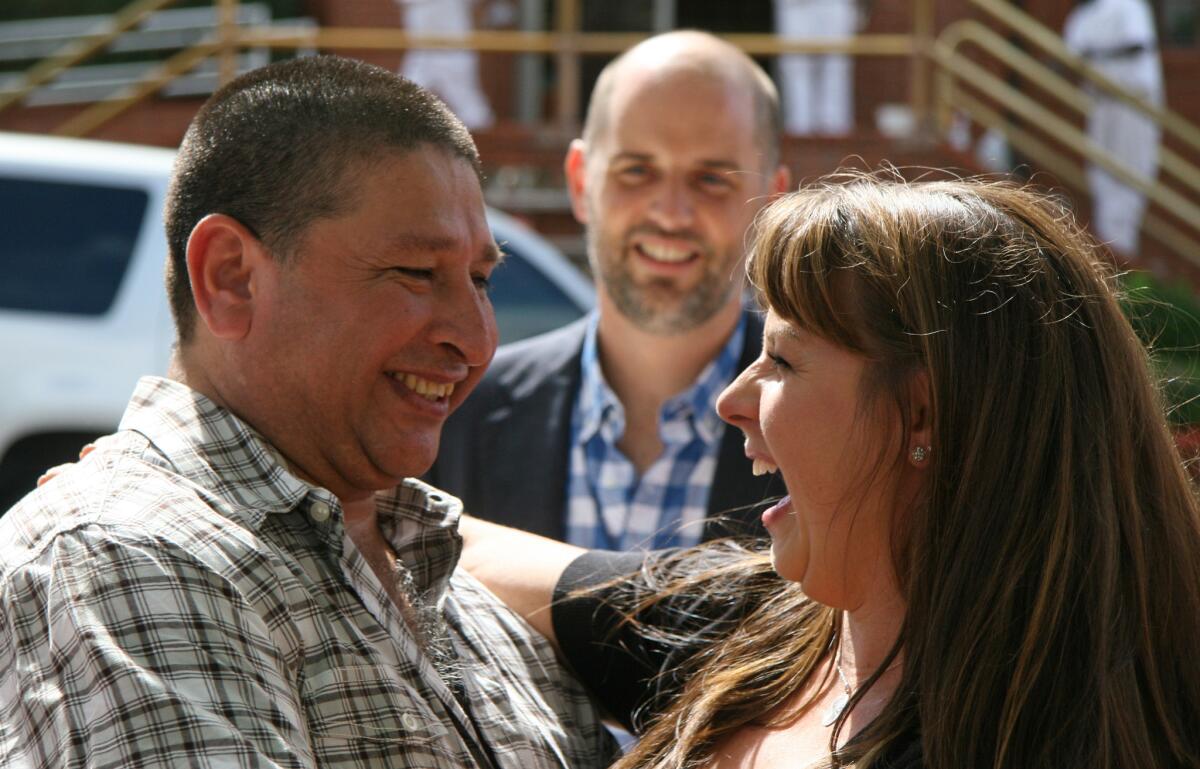Opinion: Innocent man freed: Did the system fail, or work?

Earlier this week, Manuel Velez’s nine-year ordeal ended when he was released from a Texas prison where he had been serving a life sentence for a murder he didn’t commit. Usually when these stories crop up, the problem lies with bad cops or blindly aggressive prosecutors. There was a bit of that in this case -- a ginned-up confession and failure to follow medical evidence -- but the primary problem was Velez’s own lawyer.
The Texas Monthly published a solid and detailed examination of the case last year, making it clear that Velez was working in Tennessee in 2005 when his girlfriend’s young son suffered two skull fractures and a subdural hematoma. The 1-year-old died of the injuries a few weeks later, after Velez had moved in with the mother in Texas. Both Velez and the mother, Acela Moreno, who witnesses later said had abused her son on several occasions, were charged with murder. The mother took a plea and testified against Velez, who was convicted after his lawyer failed to investigate the medical testimony and evidence against him -- evidence that now has been placed into the proper context, leading to Velez’s exoneration.
It’s a tragic story of injustice done to an innocent man, but unfortunately, it’s hardly an unusual story. Just a few weeks ago, two half brothers were released from North Carolina prisons -- one from death row -- 30 years after they were wrongfully convicted of a rape and murder.
In fact, according to a database maintained at the University of Michigan Law School, at least 34 people have been exonerated of murder charges so far this year, three of whom were on death row (including one of the North Carolina defendants). Velez himself had spent four years on Texas’ death row until his sentence was reversed by the courts because the state had presented to the jury information it knew, or should have known, was false.
It’s the death row cases that draw attention, but according to data maintained by the National Registry of Exonerations, at least 74 people have been exonerated this year of crimes for which they had been convicted. Since 1989, the start of the database, more than 1,400 people have been exonerated of crimes, 635 of them wrongfully convicted of murder, 108 of whom who had been sentenced to death.
There’s an argument to be made that this might actually be evidence that the judicial system worked properly, since these wrongful convictions were ferreted out. But a more compelling argument is that given the likelihood of errors, there are an unknowable number of innocent people serving prison sentences for crimes they did not commit.
Those who study capital punishment believe that the chances of a wrongfully convicted person being put to death are relatively low, especially given the amount of resources devoted to appealing death sentences (though it does happen). Still, one study concluded that at least 4% of those sentenced to death were likely innocent of the murder for which they were convicted. And it’s likely some of those folks ultimately have been, or will be, executed.
There are many reasons to oppose the death penalty, which we detail regularly. Among the most cogent: The risk of failure is too high, especially when the cost is an innocent life. If it’s wrong to murder, it’s even more heinous for the state to kill an innocent person based on an imperfect system of adjudication.
And it’s loathsome when the people controlling switches in the criminal justice system are unrepentant, even when their errors have been proved. Despite overwhelming evidence that Velez -- who has an IQ of 65 and limited English-language skills -- is innocent of killing his girlfriend’s child, the state of Texas forced a no-contest plea out of him to charges that he recklessly injured the child because he failed to report the mother’s abuse.
“We would have preferred to take Manuel’s case to trial to prove his innocence and hear the words ‘not guilty,’ but we couldn’t justify the risk of failure, or further injustice at the retrial,” one of his lawyers, Brian Stull, posted on an American Civil Liberties Union blog. “We couldn’t take that risk with a plea to time served on the table. So while he comes home free, he’s still tainted by this broken system.”
As are we all.
Twitter: @smartelle
More to Read
A cure for the common opinion
Get thought-provoking perspectives with our weekly newsletter.
You may occasionally receive promotional content from the Los Angeles Times.











